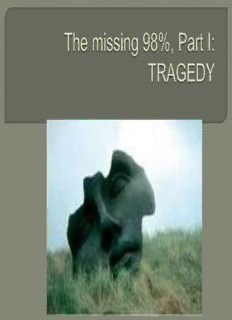
Prometheus Bound PDF
Preview Prometheus Bound
Do the maths here: Roughly 110 years Great Dionysia Lenaia Rural Dionysia A rough total of 2320 Aeschylus’ Lycourgeia tetralogy (before 456BC), one of the many that treated the theme of resistance to the Dionysiac cult Edonians, Bassarids, Youths & satyr drama Lycurgus The Oresteia tetralogy was around 5000 lines (including its satyr play) From the Lycourgeia we have around 45 lines and some testimonia The Edonians told the story of Lycurgus’ (king of the Edonians, a people of Thrace) attempt to suppress the worship of Dionysus in his kingdom, along more or less the same lines as [Apollodorus,] Library 3.5.1. At the start of the play Dionysus had just arrived in Thrace with his male and female followers. Lycurgus had both him and the women bacchants arrested, but they miraculously escaped, and Dionysus then drove Lycurgus mad, so that he killed his own son Dryas with an axe, believing that he was cutting a vine-branch. Lycurgus may well in the end, as in [Apollodorus] and as in Sophocles, Antigone 955–965, have been imprisoned perpetually in a rocky chamber on Mount Pangaeum. It has been attractively conjectured that Orpheus, who was the central figure of the following play (Bassarids), also figured in this one, before his apostasy, as a devotee (maybe a priest) of Dionysus, imprisoned with his master by Lycurgus (cf. fr. 60); Edonians was extensively imitated by Euripides when he wrote about the fate of another enemy of Dionysus in The Bacchae, and the Roman poet Naevius in his Lucurgos seems to have followed it closely. It is known from the Cataterisms of pseudo-Eratosthenes that the play dealt with the death of Orpheus at the hands of Thracian women, who in this version, unusually, are devotees of Dionysus, called Bassarids. “Orpheus,” we are told by ps-Eratosthenes, “after going down to Hades in quest of his wife and seeing what things were like there, ceased to honour Dionysus, by whom he had been glorified, and regarded the Sun (whom he also called Apollo) as the greatest of the gods; he would rise before daybreak and await the sunrise on the [Thracian] mountain called Pangaeum, so as to be the first to see the Sun. Dionysus was angry at this and sent against him the Bassarids (as the tragic poet Aeschylus says), who tore him in pieces and scattered his limbs far and wide; but the Muses collected them together and buried him at the place called Leibethra [in Macedonia].” Cambridge Greek play 2013, dir H. Eastman
Description: